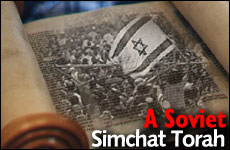 Identifying as a Jew
Identifying as a Jew


5 min read
For the Jews of Soviet Russia who celebrated nothing else, Simchat Torah was enough to transmit the full weight of what it means to be a Jew.
I know I shouldn't say this, but I used to feel that the Tishrei holiday schedule was rather grueling. Every time you turned around, there was more cooking, more cleaning, more guests, more services, more Shabbos, more Yom Tov. It was exhausting. As a mother of young children with a full time job, I would look forward to Simchat Torah for its signal of the end of the seemingly interminable holiday season.
Then I discovered something that forever changed the way I approach the holiday.
I was born in Minsk in the former Soviet Union. My family, like so many others, immigrated to the U.S. in the late 1970s. I was given life twice: once when I was physically born, and once when my parents had the courage to take me out of Soviet Russia, so that I could have my life, complete with religious observance, a profession, a wonderful family and the panoply of rights and privileges I enjoy. I will always be grateful to God and to my parents for both.
Shortly after the holidays one year, I was discussing our exodus from the Soviet Union with my mother, and she said, "In some ways, Simchat Torah influenced our decision to leave." Since my mother is not observant, this was a curious statement and I sensed that there was a lesson here.
It is no secret that the former Soviet Union was an inhospitable place for anything Jewish; one's Jewish identity was a liability, not an asset. But during the 1960s, because Israel was showing its might through its many wars, the Jews of Russia began to feel emboldened, if only slightly. Simultaneously, the American Jewish community began paying attention to the plight of Russian Jewry and initiated great lobbying efforts to pressure the Soviet government to allow Jewish immigration. With both forces converging, Soviet Jews for the first time began considering the previously impossible thought of leaving the Soviet Union for a better life elsewhere.
Equally astounding, beginning in the late 1960s, the Jews of the large cities of the Soviet Union began to congregate periodically in large demonstration-like groups around the state-sanctioned though locked synagogues. The day of these spontaneous gatherings of thousands of Jews in cities across the Soviet Union: Simchat Torah.
"Why Simchat Torah," I asked my mother. "Why not Rosh Hashana, Passover, Yom Kippur? Who knew the date? How did people find out about it? Who started the practice? Why did you go? What did you do?"
For the Jews of Soviet Russia, Simchat Torah was the one opportunity to celebrate who they were.
My mom thought these were silly questions. "We did it because all the young Jews in the city were going and we found out about it from our friends, and they from their friends. We went, we sang, we danced, we met people we hadn't seen for a while, we laughed, we read letters from Israel, we exchanged information about immigration and life abroad. It was simply one time a year when we could be unafraid and happy to be Jews, even with the KGB shills in the crowd. The feeling there was profound. We felt our strength. We saw our numbers. We realized who we were and we were proud."
For the Jews of Soviet Russia, Simchat Torah was the one opportunity to celebrate who they were. They had no other holidays to experience the various aspects of their Jewishness or their connection to each other or to the Eternal. Simchat Torah was it. More specifically, Simchat Torah was a celebration of who they were apart from being Russians, of their separate values, their separate ways, their separate status, and the separate criteria by which they were judged. On all other days, this separateness engendered hostility from their neighbors; on Simchat Torah the separateness was turned on its head and celebrated.
Many Soviet Jews participating in these rallies had never seen the Torah in whose name they celebrated. Yet, by their descriptions of the events, the Torah was never far away. Evgeni Valevich, a Russian Jewish musician, wrote a popular song to reflect the mood at those Simchat Torah celebrations. "As the old cantor sang," the song goes, "our small nation seems so great." Amazingly, this pride and sense of nationhood was such a new and feeling for so many Jews, it compelled them to transform their lives completely and emigrate.
On Simchat Torah we celebrate the Torah that we just completed reading and studying carefully over the course of the year . We know what it contains. We know the endless joys and depth the Torah's laws provide for our lives. Yet, as the Soviet celebrations indicate, this joy is not merely academic, it is also intuitive. We know in our hearts that the Torah, its values and the sense of nationhood that is its derivative, are miraculous and we must set aside a special day to celebrate. Even where Jews celebrated nothing else, Simchat Torah, with Torah at its center, is enough to transmit the full weight of what it means to be a Jew.
My mother's lesson is simple, yet profound: Celebrating the Torah on Simchat Torah is celebrating Judaism and Jews. In celebrating Simchat Torah we celebrate all the holidays taken together; we celebrate Shabbos, we celebrate mitzvot, we celebrate Jewish values, we celebrate Jewish survival, we celebrate Jewish potential. In short, we celebrate everything we are and everything we can be. Simchat Torah is not an afterthought. In some ways, it is the holiday that gives everything else perspective.
